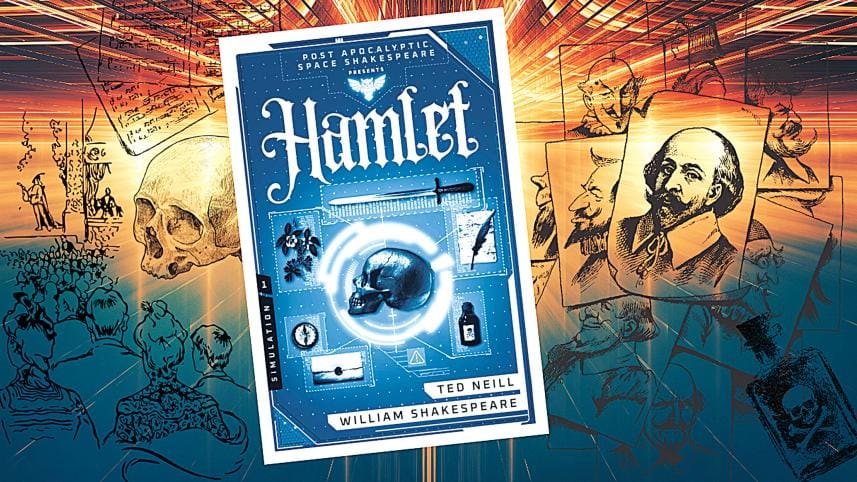A play within a space opera

When I first learned about Hamlet: Book One of the Post-Apocalyptic Space Shakespeare by American novelist Ted Neill, I was immediately intrigued. While not the first science fiction Shakespeare, Neill's attempt to produce a complete series represents a noteworthy Shakespeare project. As of September 2025, Neill has published his version of Hamlet, Othello, and Twelfth Night with "many more" listed as planned. He appears to want to produce all 37 plays.
Neill prepared his text as a stage play, complete with an introduction, a dramatis personae, a description of the setting, and five acts. Indeed, an ambitious theatre company could and should put on a live production of the play. The text is best described as "a play within a space opera." The story is set billions of years into the future in a distant galaxy where a powerful machine-based civilisation of sentient artificial intelligence entities created a human woman construct designated J-9, or Janine, and her robotic owl assistant Otto to evaluate a virtual construct of the play "Hamlet" to determine whether the now extinct human species is fit for revival.
I strongly recommend Neill's <em>Hamlet: Book One of the Post-Apocalyptic Space Shakespeare</em> series. While I wish it spoke more to our contemporary moment, it still presents Shakespeare's <em>Hamlet </em>in a fun, engaging way that could be a useful teaching tool for first-time readers.
However, the machines aren't content for Janine to passively observe the human characters from the outside, they want her to live amongst the humans as one of them to truly get to know the species. Janine disguises herself as minor background characters while Otto transforms himself into tools or pieces of clothing. Janine and Otto are visible to the other characters, but they generally try to stay out of the limelight. Though on occasion, they do directly interact with the other characters and sometimes attempt to alter events in the play. Janine and Otto can be seen as chorus figures from the ancient Greek and Elizabethan English theatre traditions.
Janine's great strength as a chorus figure is that she is both an outsider and someone who the readers share a familiar world view with. Despite her appearance, Janine is merely a construct of a human being. Everything she knows about humanity comes either from her programming, lessons from her monitor Monty, and assistant Otto. She is the objective outside observer who can pick up on the quirks and contradictions of human culture.
At the same time, Janine has been programmed with the language and the popular knowledge of the trends and practices of our contemporary civilisation. She is an ideal guide for first-time readers of the text who will often share her questions and reactions to the play. For example, in Act 1 Scene 2 of the play, she was able to clarify the significance of Claudius and Gertrude's speedy marriage and why it upset Hamlet. Most importantly, Janine is a compelling and charismatic protagonist. She cracks jokes, she has agency, and she expresses empathy. By the end of the play, she experienced Aristotle's catharsis along with the audience. She even begins to question her assigned role in the project to evaluate the play. In her own way, she has experienced a character arc as transformative as Hamlet's.
While Neill's adaptation speaks to the power of the theatrical nature of Shakespeare's original play, it lacks a contemporary relevance. At the end of the play, Janine's main takeaway is the theatre's ability to allow audience members to experience the feelings of multiple lifetimes. The good, the bad, and everything in between. While these takeaways about Shakespeare's ability to portray the human experience are unarguably true, I wanted to hear Neill speak more directly about our own contemporary post-COVID world. In a time when we are increasingly digitally connected but more socially isolated, how do we come together through our common humanity? What insights can the play offer us to help avoid the decline and extinction that Neill imagines for us?
I strongly recommend Neill's Hamlet: Book One of the Post-Apocalyptic Space Shakespeare series. While I wish it spoke more to our contemporary moment, it still presents Shakespeare's Hamlet in a fun, engaging way that could be a useful teaching tool for first-time readers. I am eager to follow Janine and Otto on the rest of their adventures.
Jonah Kent Richards is a Shakespeare screen adaptation scholar, an English teacher, and contributor for Star Books and Literature.



 For all latest news, follow The Daily Star's Google News channel.
For all latest news, follow The Daily Star's Google News channel.
Comments